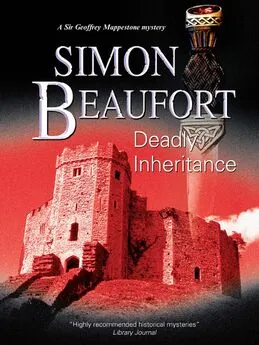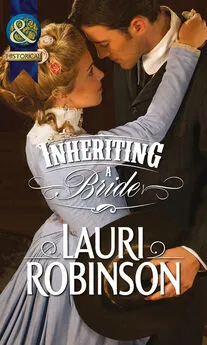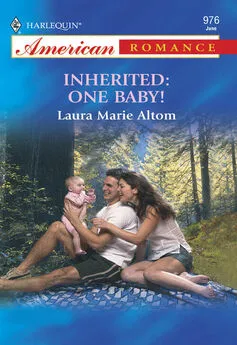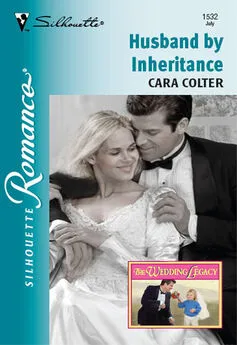Simon Beaufort - Deadly Inheritance
- Название:Deadly Inheritance
- Автор:
- Жанр:
- Издательство:неизвестно
- Год:неизвестен
- ISBN:нет данных
- Рейтинг:
- Избранное:Добавить в избранное
-
Отзывы:
-
Ваша оценка:
Simon Beaufort - Deadly Inheritance краткое содержание
Deadly Inheritance - читать онлайн бесплатно полную версию (весь текст целиком)
Интервал:
Закладка:
A bowl of water had been left in the garderobe for his morning ablutions, but there was a layer of ice across the top and he did not feel like washing in it. He scraped a dagger across his cheeks a couple of times, then glanced at the shelves holding his few clothes. The shelves concealed an entrance to a passageway that wound through the castle’s foundations before emerging in the woods. Joan’s description of relations between Goodrich and its neighbours had been unsettling, and he realized that he might be obliged to defend the castle. He knew that he should make himself familiar with potential escape or foray routes, but the tunnel was cramped, pitch-black and airless, and his irrational but paralyzing horror of dark underground places meant that he had not yet plucked up the courage to open the hidden door. Unwilling to address his fears, he turned his attention to his clothes.
Joan objected to Geoffrey wearing full armour around the estate, claiming it made him look eager to fight, and he supposed that he should make an effort to adapt to civilian life. He opted for the outfit of a knight at ease: a light mail vest under a long, belted tunic and sturdy oxhide boots. The tunic was brown. Despite Joan’s efforts to encourage him to don brighter, more fashionable colours, after twenty years of practical military attire, it was difficult to change.
When he reached the hall, breakfast had already been served and the tables and benches cleared away. He supposed he should rise earlier in future, so as not to be seen as someone who spent half the day in bed while his people worked. He grabbed bread and ale from Peter the cook, and sat with Joan near the hearth while she mended a basket. Olivier perched nearby, studying the accounts.
‘I meant to tell you yesterday that I received a message from Roger – my fellow knight from the Holy Land,’ Geoffrey said. ‘He is coming to visit.’
‘Really?’ said Olivier, pleased. He liked the bluff, northern knight, and they spent a great deal of time trying to impress each other with battle tales. Roger’s stories were grossly exaggerated, but there was more truth in them than Olivier’s: the little knight had never raised a sword in anger.
Joan was less enamoured of a man whose idea of a good time was drinking vast quantities of ale and annoying the local women. When those pastimes were unavailable, Roger looted and raided for any man who would pay him.
‘He will not stay long,’ added Geoffrey quickly, seeing Joan’s disapproving frown.
‘Helbye thinks you should ask Prince Tancred to be reinstated,’ said Joan, clearly worried about what might happen with two restless Jerosolimitani in residence.
Geoffrey stared at the flames in the hearth. ‘There is nothing I would like more, but Tancred’s last letter made it clear that will never happen. I spent too long following the orders of the King, and no prince wants a knight who accepts commissions from another master.’
‘Tell him you did not accept them readily,’ said Olivier. ‘The King forced you to remain in England – and you did it to help Joan. Surely he will understand?’
‘He considers my loyalty compromised,’ said Geoffrey, recalling Tancred’s scathing words. ‘And there is also the matter of my former squire, Durand.’
‘Durand,’ said Joan, scowling. ‘The King’s spy. But what does he have to do with your predicament? I know Tancred charged you to turn him into a warrior, but surely you told him the task was impossible?’
Unfortunately, Durand’s feckless, cowardly dishonesty was irrelevant to Tancred, which left only the bald fact that Geoffrey had failed in his commission. That, combined with his long absence following the King’s bidding, had destroyed their friendship; Geoffrey knew there was no point travelling to the Holy Land to put forward his case in person. He reached inside his tunic and pulled out the last letter he had received from Tancred. Olivier read it, then passed it back without a word. Joan raised questioning eyebrows. Unlike her husband and brother, she was illiterate.
‘Tancred says Geoffrey had no right to obey King Henry’s orders, and says he will never trust him again,’ summarized Olivier. ‘He thinks Geoffrey should have ensured Durand returned to the Holy Land rather than joining the King’s service, because he had talents Tancred wanted to harvest himself. He also says that if Geoff sets foot in his lands again, he will be executed as a traitor.’
Joan gaped. ‘But I thought you were friends.’
‘So did I,’ said Geoffrey shortly. He was still bewildered by the bitter tenor of Tancred’s words, as he had loved Tancred as a brother. He had assumed that the Prince would understand his desire to help his sister, so he was shocked by the petty, mean-spirited response. He was also bemused by the importance Tancred affixed to Durand, whom Tancred had earlier despised.
‘Then I suppose you must live with it,’ said Olivier. ‘You can either accept the post the King offered or stay here. Another pair of hands is always useful.’
Not for the first time, the reality of the situation hit Geoffrey. He longed to be away from Goodrich’s drudgery, but he had nowhere else to go. He did not want to sell his martial skills to the highest bidder, like other knights, because he did not want to fight for a cause in which he did not believe. The alternative was to become a royal agent – but he did not like the King, and accepting his commission would be akin to selling his soul to the Devil. Glumly, Geoffrey stood and left the hall.
Geoffrey spent the day riding through forest and steep-sided valleys. His black-and-white dog loped at his side and his horse cantered gamely along remote tracks. By sunset he was less gloomy, and he arrived at Goodrich in time for the evening meal. Tables and benches were arranged in the hall for the servants, while Geoffrey joined Joan and Olivier in a niche near the hearth. Afterwards they went to the solar on the upper floor, leaving the hall to the servants. A fire filled the chamber with welcoming warmth, and, tired from his exercise, Geoffrey began to feel sleepy.
‘What happened to Durand?’ asked Olivier, strumming a harp-like instrument from Turkey that Geoffrey had given him. ‘The last we heard, he was accused of a serious theft. The King is unlikely to hang a squire for stealing, as he might a peasant, but I anticipate he was heavily fined?’
Geoffrey shook his head. ‘God knows how, but not only did Durand escape punishment, he inveigled himself a post in the King’s household. He is now a senior clerk.’
Joan was astonished. ‘I thought he would have been sent back to Tancred in disgrace.’
‘Durand did not want to return to Tancred, because Tancred would have forced him to train as a soldier. He decided to make his fortune in England – and he has done just that. He writes occasionally, describing his progress.’ Although Geoffrey had not liked his old squire – a feeling wholly reciprocated – it was difficult not to admire his capacity to make the best of a bad situation. ‘It is a pity he was dishonest; I miss his resourcefulness and intelligence.’
‘What of Bale?’ asked Olivier. ‘The man I found to replace Durand? How is he?’
Geoffrey leant down to scratch his dog’s head, loath to answer. Bale was not up to the task, but Geoffrey did not want to offend Olivier by saying so.
‘I would like to know what actually happened when Henry died in the stables,’ he said instead. ‘I could ask other people, but I would rather hear it from you.’
‘Very well,’ said Joan with a long-suffering sigh. ‘What do you want to know?’
‘You have already said you do not know who killed him, so I will settle for hearing what happened when you found his body.’
‘I discovered him the next morning,’ obliged Olivier, pulling his legs up on to the seat of his chair when Geoffrey’s dog stood and shook itself. The animal had a tendency to bite. ‘When I first saw him, with the dagger in his stomach, I assumed someone had killed him. But I have since reconsidered. Now, I think he killed himself.’
Joan glared at the dog when it moved towards her. Prudently, it backed off, flopping down again at Geoffrey’s side. ‘At the time, I believed he had been murdered by a Bristol merchant, but was later proved wrong. Now I do not know what happened – nor do I want to.’
‘It was suicide,’ pressed Olivier. ‘Henry was deep in his cups, and became overwhelmed with self-pity.’
‘Do not look sceptical, Geoff,’ admonished Joan. ‘Henry was violent, surly and selfish, and no one liked him. He often felt sorry for himself. Moreover, if he was alive now, you would be fighting each other.’
She was right about Henry’s aggression: he and Geoffrey had fought constantly as boys, and Henry had carried the feud into adulthood. Geoffrey was unconvinced by Olivier’s theory, however. ‘Henry was not the kind of man to inflict harm on himself. He was more likely to vent his anger on others.’
‘I agree with you,’ said Joan. ‘I believe he was murdered, too. But I also think it will do no good to investigate.’
‘Turning a blind eye to murder is tantamount to inviting the culprit to strike again,’ argued Geoffrey. ‘Or, if the culprit is a villager, telling him it is acceptable to kill his overlords.’
‘I was tempted to kill Henry myself on occasion,’ snapped Joan. ‘And there is not one of our servants, villagers or neighbours who did not feel the same way. Unless someone confesses, we will never know.’
Geoffrey regarded her steadily. ‘Then are you happy with this state of affairs?’
She met his eyes. ‘Yes. Most people were relieved when he died, including me. It is easier to manage the estate without him. And, of course, you benefited, too.’
‘There was a rumour that you killed him, because he stood between you and Goodrich,’ supplied Olivier.
Geoffrey had known it was only a matter of time before fingers pointed at him as the man who had gained most from Henry’s death. ‘I have dozens of witnesses who will testify that I did not slip off for a few days to murder my brother. Besides, I never wanted to inherit Goodrich.’
‘We know,’ said Joan gently. ‘And we have done our best to quell the rumours.’
‘Jervil did not mean any harm by his comments,’ said Olivier. He slapped his hands over his mouth in alarm. ‘Damn!’
‘Who is Jervil?’ asked Geoffrey.
‘Our groom,’ replied Joan, glaring at her husband. ‘The accusation that you killed Henry originated with him, because he thought no one else would have the courage. He meant it as a compliment.’
‘Some compliment,’ muttered Geoffrey. ‘No wonder people run when they see me coming!’
‘That is nothing to do with Jervil,’ said Joan. ‘That is because Father Adrian has been telling them about the Fall of Jerusalem and the slaughter that followed. He says only the most vicious, hardened and ruthless soldiers survived – and Helbye says nothing to contradict him.’
‘Helbye tells people what they want to hear,’ ventured Olivier. ‘They are more interested in tales of terror and death than in stories of mercy and forbearance.’
‘I will speak to him,’ said Geoffrey, reaching for his sword and buckling it around his waist. It was an instinctive action, and he barely realized he was doing it.
Joan eyed it disapprovingly. ‘You will not improve your reputation if you walk around armed like a Saracen. You do not need a sword to speak to your friends, surely?’
Given what had happened to Henry, Geoffrey was not so sure.
Читать дальшеИнтервал:
Закладка:








